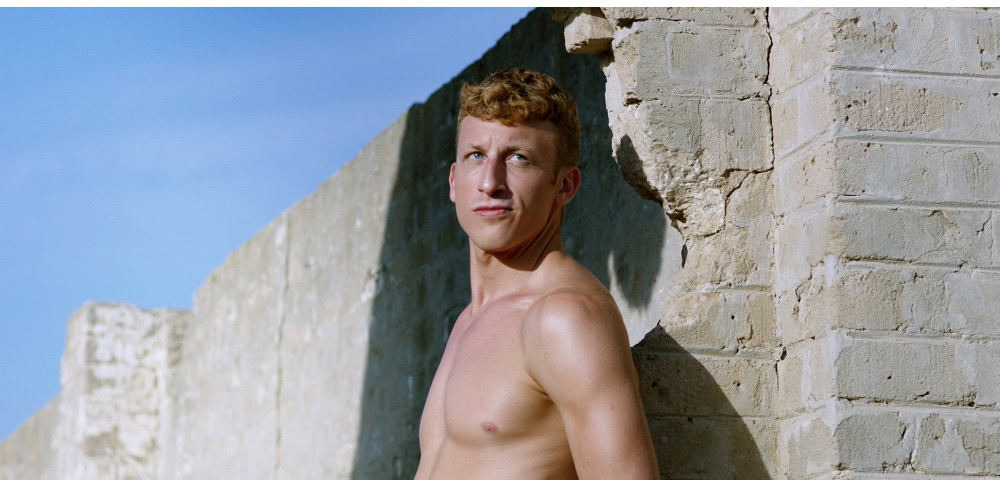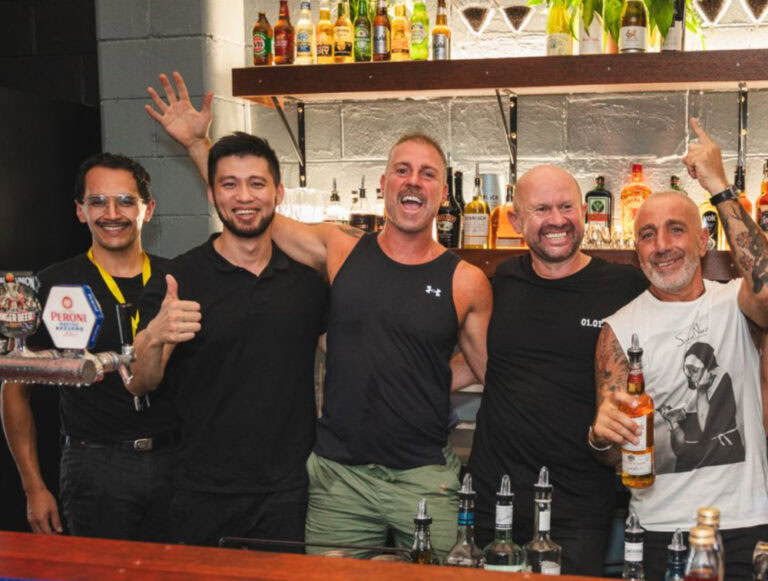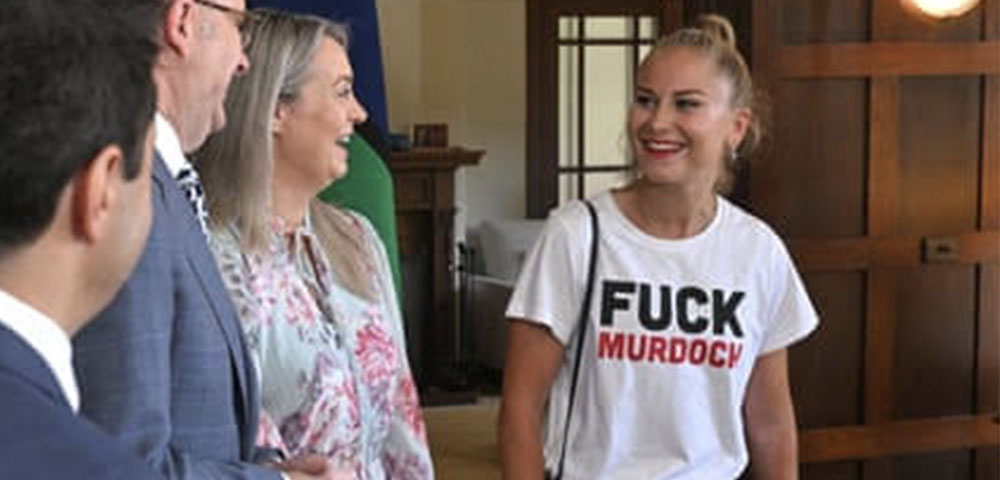
Israeli Film At MQFF Causes Rift Within The Community

The 31st edition of Melbourne Queer Film Festival was meant to be a triumphant return to theatres after COVID lockdowns, with a promise of “stories in every colour”. However, one particular story at the festival, that concludes on Monday, has divided the community, led to allegations of “pinkwashing”, protests, and calls for boycott.
Israeli film The Swimmer tells the story of bullying and discrimination in professional sport and is based on director Adam Kalderon’s own experiences as a professional swimmer in the country’s swimming team.
“The Swimmer is dedicated to a silent, disempowered and hidden populace – gay athletes,” Kalderon told Star Observer in a statement.
Calls For Cultural Boycott
We've officially launched the #MQFF31 program! We're back from 18-29 November, at @ACMI @cinemanova and @villagecinemas Jam Factory, and online Australia-wide! So much to see, tickets on sale to members now, and general tickets from tomorrow at https://t.co/lv0HhUXt2m 🚀🌈🥳 pic.twitter.com/EiOF3WalpB
— Melbourne Queer Film Festival (@mqff) October 27, 2021
Queer Palestinian activists and their allies allege by programming the film, the festival ignored the pinkwashing agenda – promoting Israel’s progressive treatment of sexual minorities as a way of ignoring its conflict with the Palestinians.
They called for the film to be removed from the program, sought accountability for the programming of films from Israel and asked the festival to sign up to the Boycott, Divestment, Sanctions (BDS) policy.
The festival rejected the calls to remove the film and went ahead with the screening. In a statement, the MQFF board said that they had heard the views of both the BDS supporters and others in the community.
“The MQFF Board considered that even with this small snapshot of community feedback, that views within LGBTIQ+ communities are mixed and both keeping or removing the film is likely to go against the views of some within our communities. It also considered that there are other parts of the community who have not had an opportunity to be consulted on this issue,” the statement said.
Responding to allegations of pinkwashing, the board said that it had considered that the complaint “regarding this film was based on its country of origin, and that the film is propaganda of the State of Israel which pinkwashes the treatment of LGBTIQ+ Palestinians.”
“The MQFF Board considered that the content of this film does not focus on the Israel/Palestine conflict but is a personal narrative that focuses on homophobia within elite sport which is based on the director’s own experiences as an athlete. The Board considered that the film is funded by the Israel Film Fund, however noted that a majority of films within the festival receive government funding from relevant institutions in their country of origin.”
‘No Blanket Ban On Israeli Content’

On the demand to adopt the BDS policy, which would mean boycotting all queer films from Israel, the board said that “it does not believe that a blanket ban on Israeli content supports MQFF’s mission – to change lives through the experience of shared stories.”
“The MQFF Board has considered that it needs a framework to allow it to fairly assess and balance viewpoints from the multitude of voices in our community on issues such as this – and continue to deliver on our core mission. It agreed that the organisation will implement this framework as an extension of our curatorial guide and will consult broadly with the community to ensure that all parts of the LGBTIQ+ communities are able to have their say,”added the board.
The festival pointed out that its opening night film was Flee, about a gay Afghan refugee and its program included Namibia’s first ever LGBTIQ+ feature, Kapana, Palestinian film Borekas, and the Iranian film Mani.

The statement did not satisfy the BDS supporters, both within MQFF as well as the filmmaking community.
Molly Whelan, co-president of MQFF and board member, Nayuka Gorrie stepped down from the board.
“As an Indigenous person of this place, allowing myself or any organisation I’m a part of to be used in the propaganda machinery of a settler state makes me sick and sad,” Gorrie said in a resignation letter, which was supplied to VICE.
Standing In Solidarity With Queer Palestinians
Queer Jews against pinkwashing Israeli apartheid – banner at protest at @mqff #boycottMQFF #mqff pic.twitter.com/s2zjsbRvxd
— ariel estrins (@arielestrins) November 19, 2021
On the opening night of the festival, a group of Queer Palestinians and their allies protested outside the The Jam Factory. The protest was organised by a collective led by queer Palestinians against MQFF’s decision to screen The Swimmer.
Palestinian queer activist Jeanine Hourani, posted a statement by the collective on Twitter.
“Members of the Queer community and the Palestinian community, and those at the intersections of both, have called on the MQFF to pull The Swimmer from their program and adopt an official Cultural Boycott policy for the festival,” the statement said.
@mqff stop pink washing the evils of Israeli brutality against the Palestinians. @jeaninehourani pic.twitter.com/Tz2X7jGPuS
— Nasser Mashni (@iamthenas) November 19, 2021
“MQFF has an opportunity to do the right thing and stand in solidarity with queer Palestinaians before the damage done to the festival is irreparable. MQFF was born out of protest and resistance, it is time the festival’s legacy is honoured.”
“Although the film does not directly address the Palestine and Israel conflict, Hourani accused the film of “pinkwashing”.
“The State of Israel adopts many tools and tactics to mask their brutal regime over Palestinians, and the continued theft of land, resources and denial of Palestinian human rights,” the statement added.
Apolitical MQFF
incredibly disappointing that an institution that is there to support and escalate local queer filmmakers has let them walk out of the festival. it seems that supporting pro-Israel pinkwashing is more important to them!
— sam (@samxmcgowan) November 26, 2021
Some filmmakers also requested that their films be removed from the festival to stand in solidarity with Palestine.
Melbourne based filmmaker, Sam McGowan said he was disappointed that the MQFF was not listening to queer Palestinians on the issue.
“They (MQFF) can’t be apolitical. I think is just impossible and especially as a queer film festival to take that stance is wrong,” McGowan told Star Observer. The filmmaker has contributed to the MQFF in the past but said after learning more about the Palestine and Israeli conflict, he could not justify having his film feature at this year’s festival.
“I love MQFF, that’s why I participate and go watch films but I felt with what they were doing, this was the only option,” said McGowan.
First time MQFF contributor Ari Tampubolon also asked for their short film Intimate Partner to be removed from the program, accusing the festival of making contradictory statements.
“They (the MQFF) say they don’t want to censor queer film makers but in affect it still is an act of censorship because you are ignoring the voices of Palestinians. You can’t experience queer joy at the expense of someone else.”
Telling More Stories, Not Less
Within the LGBTQI community too, there were many opinions about the film as well as the demands for a boycott. LGBTQI Jewish group Aleph Melbourne has in the past walked the Pride march with gay Arab and Lebanese men.
“From the outset I’d like to reiterate that Aleph Melbourne does not take a position on Middle East politics. We stand up for the rights, dignity and inclusion of all LGBTIQA+ people, in Melbourne and elsewhere,” Aleph Melbourne co-convenor Michael Barnett told Star Observer.
“We support telling the stories of the lives of LGBTIQ+ people, the discrimination we face, the challenges we endure on a daily basis, and the love and happiness we find. The Melbourne Queer Film Festival provides a platform for filmmakers to tell these stories and we commend the festival and the filmmakers for their efforts.”
“We support telling more stories, not less, and certainly do not support the censorship of any of them, as that is the start of a slippery slope,” said Barnett.
“In 2006 Aleph Melbourne walked hand-in-hand with the gay Arab and Lebanese men at Pride March. We stand in solidarity with all LGBTIQ+ people and fight for their rights to be their authentic selves, no matter where they live, or whether the oppression they face due to their sexual orientation or gender identity arises from religious ideology or state-imposed intolerance,” added Barnett.
The film’s director Kalderon commended the festival for going ahead and screening the film.
“The gay community is still hunted in several communities in the world, and has not attained the status of equal rights. Dismissing or vetoing films of personal stories is an aggressive use of power and totally against the concept of equality. I congratulate the festival management for standing up under pressure and allowing my film to be part of the festival. The entanglement of culture and politics clashes with the idea of a gay festival,” Kalderon said.
(With inputs from Shibu Thomas)
If you feel distressed reading the story, you can reach out to support services.
For 24 hour crisis support and suicide prevention call Lifeline on 13 11 14
For Australia-wide LGBTQI peer support call QLife on 1800 184 527 or webchat.









